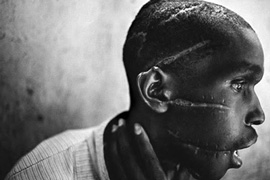Rwanda marks genocide anniversary
The legacy of the 1994 genocide continues to cast a shadow over Rwanda.

Al Jazeera’s Yvonne Ndege, reporting from Nyanza, said: “Many of them had come here to seek refuge and protection from a small UN mission that was based here.
“Of course, the UN eventually pulled out and at least 5,000 people met their deaths in a very brutal manner.
“There is also representation from the international community who basically did nothing during the genocide. Everybody at 12:00 [09:00 GMT] will have a moment of silence for those who lost their lives,” she said.
History of violence
Rwanda has always been divided between ethnic Hutus, who make up 85 per cent of the population and the Tutsi minority.
| In depth |
|
|
But when a plane carrying Juvenal Habyarimana, the former Rwandan president, and Cyprien Ntaryamira, his Burundian counterpart, was shot down on April 6, 1994, it signalled the start of 100-day period of attacks by Hutu fighters on Tutsis and moderate Hutus.
According to the latest figures released by the UN and Rwanda’s government, at least 1.2 million people were killed by the Hutu fighters known as the Interahamwe.
Many in Rwanda accuse France of backing those behind the killings and ignoring Rwandans targeted during the genocide.
France had close ties with the Hutu government and had signed a military agreement with Habyarimana in 1975.
Inactive response
Besides blaming France for failing to acknowledge its role in the genocide, Kigali has repeatedly accused world powers of not doing enough to hunt down suspected perpetrators of the genocide who are still at large.
 |
| The genocide has consequences that are still being felt today [AP] |
Hundreds of suspects sought over their involvement in the killings are living in countries such as France, Belgium, Canada, Kenya and the Democratic Republic of Congo.
Al Jazeera’s Ndege said: “Rwanda is definitely on the road to healing, and traditional courts have brought along tremendous reconciliation amongst the Rwandan people, but there is still a lot of public anger about the inaction of the international community and the UN who ignored what was happening.”
She said there was an International Criminal Tribunal based in Tanzania which has tried to put the wrongs to right, but their efforts have remained controversial.
“In many ways, the tribunal is about trying to get the international community to take responsibility for what happened in the genocide and for the fact that they had previous information that a genocide was being planned,” she said.
Rwanda’s criminal investigations department said that 2,178 cases of murder, torture and intimidation of genocide survivors had been recorded since 2007.

